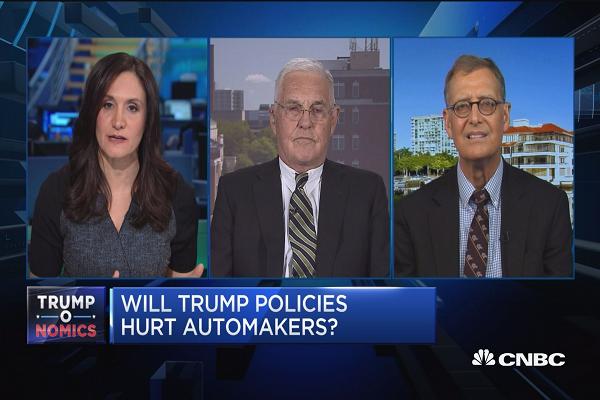President-elect Donald Trump’s vow to renegotiate the North American Free Trade Agreement, or NAFTA, would have a detrimental impact on the United States’ automobile industry and its jobs, VLF Automotive CEO Bob Lutz told CNBC on Friday.
Once Trump looks at the impact of the goals he voiced on the campaign trail, he will find a way out of pushing the auto industry into disarray, Lutz said on CNBC’s “Power Lunch.”
“I have every confidence that this is a campaign promise that is designed to be broken,” Lutz said.
“Trump is a reasonable, good, analytical businessman. Once he takes an earnest look at pluses and minuses of dealing with NAFTA and sees what the impact on American jobs [is],” he’ll find a way to roll back any promise of dismantling the agreement, Lutz contended.
The problem with Trump’s argument that producing car parts abroad constitutes unfair trade practices is that there are international systems in place that are mutually beneficial, said Lutz, who was formerly the vice chairman of General Motors.
“Today there is a global flow of parts and technology,” he said. “A lot of those Mexican-assembled units contain a very, very vast majority of U.S.-made mechanical components like engines and transmissions that are exported from the United States.”
“We also export cars to Mexico and to Canada, so my guess is if he wants to look at unfair trade … he would need to look at the Germans before anything else, because we have a 10 percent tariff going into the EU, which hits all American-produced cars,” Lutz added.
And if the United States puts tariffs on Mexico and Canada to prevent cars from being assembled there, policymakers would have to put tariffs on a number of other countries including Japan, which before NAFTA inundated the U.S. market with cars, the CEO said.
“Fundamentally, you have to look at the brand. Where is the brand located? Where is the engineering conducted? Where is the value added of the design done? Where does profitability return to for reinvestment?” Lutz asked.
By that judgment, Lutz said that a Japanese Toyota Camry, though it’s assembled in the United States, is not an American car, which would suggest the globally intertwined automobile actually benefits from free trade agreements like NAFTA.
“Final assembly accounts for about 11 percent of the value of the car,” Lutz said. “So focusing purely on where the final assembly plan is I think displays a lack of knowledge of how the automobile industry actually works.”
source”cnbc”





